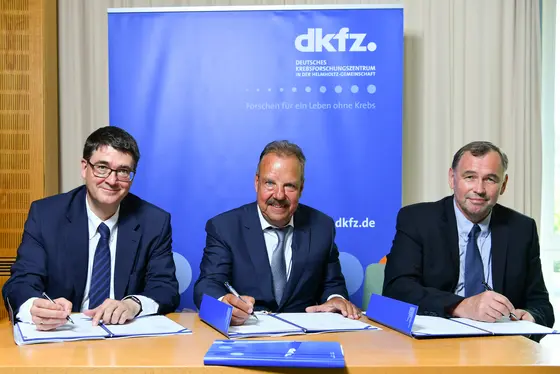His sister's cancer prompted Dieter Morszeck to contemplate supporting cancer research. He thus came into contact with the German Cancer Research Center (DKFZ) in Heidelberg. “We looked at the Center and were able to see for ourselves that research conducted here is useful and good,“ Morszeck said upon signing the agreements for the individual projects. “The DKFZ's status in Europe and in the world has impressed me very much. My donation can also be seen as a way to say thank you for the commitment to my sister.“
“At the DKFZ, we have a vision of tomorrow's patient to whom we seek to offer better therapies,“ said DKFZ Chairman and Scientific Director Michael Baumann at the signing ceremony. “In order to achieve this, we must steadily attain supreme scientific achievements – both in research and in the development of personalized precision oncology. The support by the Morszeck Foundation is a wonderful gift to help us in this endeavor.“
“Innovative cancer research involves substantial costs,“ said DKFZ's Commercial Director Josef Puchta, who is very pleased about the financial support. “Private research funding, particularly an enormous sum such as the €30 million provided by the Dieter Morszeck Foundation, helps us undertake promising projects and execute them much more rapidly.“
Morszeck intends to follow the projects receiving his support with interest and he promises: “This is not the end but rather the beginning of a long-term collaboration.“ He thus sets an example that is hard to match.
The DKFZ will use part of the funds from the Dieter Morszeck Foundation to erect a building for fully and semi-automated collection of biospecimens. Up to now, collecting blood and tissues samples, which are very important in prevention research, has involved laborious manual work which will be taken over by robots in the new biorepository.
In another project, the DKFZ plans to close an existing gap in the transition from preclinical development to application in patients by a newly established research group for imaging and image-guided therapies. Yet another new junior research group seeks to advance approaches combining molecular diagnostics, such as liquid biopsy, and powerful imaging technologies in early detection cancer screening.
Single cell genomics make it possible by now to gain a better understanding of the molecular variety of tumor cells. In the long term, these results can help develop more effective treatments. With the financial aid provided by the Dieter Morszeck Foundation, the DKFZ will be able to establish a new research group and a laboratory unit for single cell analysis. Another major DKFZ concern is to educate and train the next generation of researchers and medical doctors engaged in research. With its funding program that accepts five to eight clinician scientists per year, the DKFZ will now be able to make a major contribution to training and continuing education for young talents in this important professional discipline.
A picture for this press release is available for download at:
Spende.jpg
Upon signing the funding agreements: DKFZ Chairman Michael Baumann, donator Dieter Morszeck, and DKFZ Commercial Director Josef Puchta.
Note on use of images related to press releases
Use is free of charge. The German Cancer Research Center (Deutsches Krebsforschungszentrum, DKFZ) permits one-time use in the context of reporting about the topic covered in the press release. Images have to be cited as follows: “Uwe Anspach, Deutsches Krebsforschungszentrum“.
Distribution of images to third parties is not permitted unless prior consent has been obtained from DKFZ's Press Office (phone: ++49-(0)6221 42 2854, E-mail: presse@dkfz.de). Any commercial use is prohibited.



